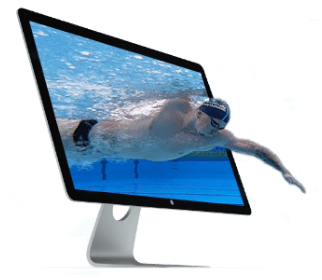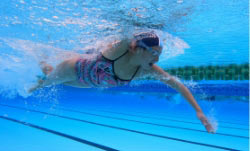Power words are words which if thought about while performing an action, can improve that action dramatically. For example, imagine a golfer lining up to sink a 6 yard putt on the 18th hole. He needs to sink this shot for the win. The pressure on him to perform is enormous.
Now pause for a moment. What do you think a professional golfer would be saying to himself? “HARD AND FAST…HARD AND FAST” or “STEADY…STEADY…”.
The latter of course.
In swimming it is no different. There are two power words which if thought about and repeated while swimming, your swimming will immediately improve. Not only in the way it feels, but in speed, in ease and in smoothness.
These two words are “LONG” and “RELAXED”.
Repeat them when you’re swimming.
“LONG” and “RELAXED”.
When I use this technique with swimmers who are starting out or have little experience, the results are dramatic. It’s common to have swimmers tell me they ‘finally get it’ once they experience swimming long and relaxed.
What do I mean by ‘long’?
Swimming ‘long’ means to be as torpedo like as possible. You should imagine yourself reaching for the wall in each stroke and pulling right back past your hip. The longer you can make your body the less resistance you will create and the faster you will go.
What do I mean by ‘relaxed’?
To go faster in swimming, you need to relax your body. Contrary to what comes natural when we attempt to speed up, you must relax your arms, your shoulders and your legs to increase your speed. Rather than swimming ‘tense’, relax your muscles and allow yourself to power through the water without fighting it. This is absolute key to swimming fast.
During your next workout, imagine yourself swimming ‘long’ and ‘relaxed’ and instantly see the benefits.



nice, thanks
can i ask a question? i swim free-style continuously 1km/ turn/ day, is it enough ?
or can you give me a good swimming excersice schedule, for healthy
1 KM ISNT ENOUGH BUT BETTER THAN NOTHING ….
IT DEPENDS HOW FIT U ARE
I understand “long”. but for “relaxed”, the core should be “plank”, right? and the pull should be “tense”?
What happened to early recovery.? If I pull through to the push stage of the stroke my shoulders are on fire after a lap or two. I do have shoulder problems, but if I release the water just at the end of the pull, it doesnt seem to agrivate the shoulders as much. But a fabulous idea you put forward.
cheers Gen-X